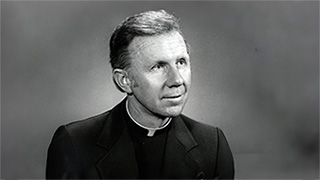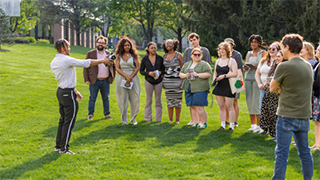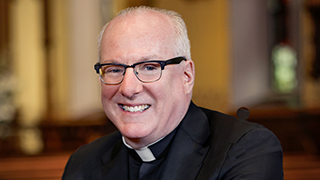A Feast for the Mind, Heart, and Soul: The Life-Changing Impacts of ICSST’s 2023 Ecumenical Symposium in Rome, Italy
Tuesday, March 12, 2024
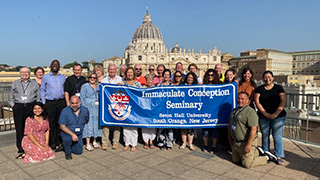 Storm clouds stirred in the sky. Flights in the northeast were delayed and canceled.
Eight pilgrims heading for Rome, Italy, were delayed at the airport for 24 hours.
But when they had finally arrived in Rome, the group was already a family. What could
have led to discouragement became an opportunity for connection and community. This
was just the start of what would be more than a trip, but a spiritual journey with
impacts reverberating today in New Jersey and beyond.
Storm clouds stirred in the sky. Flights in the northeast were delayed and canceled.
Eight pilgrims heading for Rome, Italy, were delayed at the airport for 24 hours.
But when they had finally arrived in Rome, the group was already a family. What could
have led to discouragement became an opportunity for connection and community. This
was just the start of what would be more than a trip, but a spiritual journey with
impacts reverberating today in New Jersey and beyond.
In collaboration with the Lay Centre at Foyer Unitas (Rome, Italy), “Grace and Action: The Ministry of Catechists in the Footsteps of St. Paul” was an ecumenical symposium in Vatican City, held July 26–July 31, 2023, in a retreat house just 20 yards from St. Peter’s Square. Thirty graduate students, alumni, and collaborators of Immaculate Conception Seminary School of Theology (ICSST), Seton Hall University, came to learn best practices in catechetical ministry from speakers who hailed from 13 countries around the world. Key speakers included Cardinal Giorgio Marengo, I.M.C. of Ulaanbaatar, Mongolia, Archbishop Mark O’Toole of Manervia, Archbishop Ian Ernest of Rome, Bishop Paul Tighe from Ireland, Reverend. Daniel Pratt Morris-Chapman, Ph.D., and Mrs. Grace Pratt Morris-Chapman of Uganda, and Sr. Albertine Ilunga Nkulu, F.M.A of Rome.
The symposium was offered through ICSST’s 4:12 Pathway for Pastoral Leadership: Building an Authentic Culture of Discernment, Encouragement and Accompaniment, based on Ephesians 4:11-12: “And he gave some as apostles, others as prophets, others as evangelists, others as pastors and teachers, to equip the holy ones for the work of ministry, for building up the body of Christ.” The week-long conference and pilgrimage included opportunities that sparked the hearts of the pilgrims and transformed how they would accompany others in their ministries when they returned home.
Together on the Journey
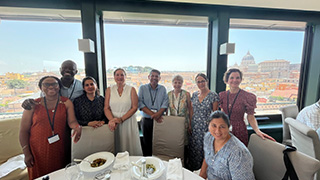 What comes to mind when we hear the word “conference” is often an image of a large
room with agendas, speakers and breakout sessions. But this July gathering elevated
and transformed casual meetings into true human encounters. Between the conference
talks and tours of basilicas, conversations sparked reflection and friendship. Many
of these conversations took place at mealtimes, on long walks and even at gelato tastings.
What comes to mind when we hear the word “conference” is often an image of a large
room with agendas, speakers and breakout sessions. But this July gathering elevated
and transformed casual meetings into true human encounters. Between the conference
talks and tours of basilicas, conversations sparked reflection and friendship. Many
of these conversations took place at mealtimes, on long walks and even at gelato tastings.
These weren’t just participants but pilgrims accompanying one another on their spiritual journeys. Palma Anton serves as a spiritual director and retreat leader at the Shrine of St. Joseph, in Stirling, NJ. She saw how the pilgrimage affirmed the unity needed to do God’s work: “Where one person is lacking, the other is gifted and so as One Body, we are united. We need each other—to journey together—in order to bring all the gifts necessary to continue the mission of Jesus Christ.”
Beauty in the Ordinary
Anton was also struck by the beauty found in the ordinary of our faith journeys. She noticed sunlight dapple the most beautiful treasures of the eternal city—from ancient churches and basilicas to plazas with quaint storybook shops and historical carvings in walls. But her eyes were drawn to the everyday people drinking from the stone fountains, including children laughing as they tried to drink from the spouts and mothers correcting them for not sharing the fountains with others.
“It is in the ‘everydayness’ that God draws me to ministry. It was this experience, among the secular sites and families that I felt an inner, quiet peace,” Anton said. “God was with me here, not just in the famous religious sites, but in a very special way, in the everydayness of Rome.” Anton, like many other pilgrims, embraced her role as a pilgrim embarking on a journey—a journey where her vision was expanded to notice God’s presence with wonder and reverence.
While many conferences focus on transmitting information, this conference was an invitation to spread the faith. These pilgrims came prepared to receive the Holy Spirit through joy, friendship and hearts for Evangelization.
Prayer Life in Lay Ministry
In his apostolic letter "Antiquum ministerium" (“Ancient ministry”), Pope Francis made official the ministry of the lay catechist. Pathways 4:12 has responded to the call to understand what it means to form and support the ministry of lay catechists, and one of those ways is through nurturing a strong prayer life.
From a rooftop terrace overlooking St. Peter’s Basilica, the diaconal pilgrims prayed "The Liturgy of the Hours" in the morning and evening. By the second day, many other pilgrims joined in praying with the deacons. No matter where they were gathered—Mass, St. Peter’s crypt, outside the walls of the Basilica of St. Paul—prayer was the beating heart of this pilgrimage.
When the lay ministers joined the deacons in evening prayer, their ministerial role became clear: Lay ministry flourishes when it is grounded in prayer. As Mary Landriau said, “It was a pilgrimage, not a trip. We were there with a purpose to feed our own faith and prayer life so that we could bring it back to our ministries.” Landriau is a faculty associate of social work at Seton Hall and a catechist at St. Bernard of Clairvaux Parish, in Plainfield, NJ. As a professional social worker, Landriau saw the important relationship between responding to her own baptismal call and accompanying others on their journeys. She realized that when she accompanies clients through dark and difficult journeys, God would nourish her through a life of prayer.
Finding Friendship and Joy on the Journey
The word accompaniment comes from the Latin roots “cum pane,” meaning “to share bread with.” For these pilgrims, accompaniment became a concrete reality as friendships grew out of shared meals. These Eucharistic encounters enlivened the pilgrims’ experience.
In many Gospel stories like the Road to Emmaus, Jesus draws others to Himself by walking right alongside them. There is an art to this practice. In an age where our relationships are mediated by technology, accompaniment is a way of drawing closer together to listen and appreciate the stories of others as well as to rekindle the light of a strong faith.
From wise speakers who stirred hearts to the stories shared over meals, many described the experience as a journey filled with a palpable sense of Christian joy—the joy of communion. While the presentations nourished their minds, the pilgrims recognized the beauty of being embodied Christians from their side-splitting laughter at mealtimes to the deep connections forged by their proximity during long walks and meaningful conversations. Here friendship and communion were not just discussed as topics of interest but elevated as essential to life in ministry.
Building Relationships through Tenderness and a Whisper
For many pilgrims, Cardinal Giorgio Marengo, I.M.C.’s opening talk “We Are Ambassadors of Christ: Whispering the Gospel in the Heart of Asia” set the tone for the entire symposium. His talk was rooted in his experience ministering to the people of Mongolia. Since the act of whispering often takes place between friends, rather than strangers, it requires time devoted to knowing a person, building and gaining trust, and becoming empathetic.
Deacon Andrew Saunders, director of ICSST’s Center for Diaconal Formation noted that for a newly ordained deacon at ordination the bishop places the Book of the Gospels in his hands saying, “Receive the Gospel of Christ whose herald you have become.” Cardinal Marengo reminded Deacon Saunders “that as a deacon often the most effective heralding of the Gospel is to whisper it in the intimacy of friendship and companionship. Walking in the footsteps of St. Paul with my fellow pilgrims, were grace-filled moments that enabled us to whisper the Gospel to each other in friendship and in our joys and sorrows. Our time together had a deeply profound impact on my diaconal ministry and taught me to herald the Gospel of Christ by whispering it to others with a tender and caring heart.”
Laura Balogh, director of Religious Education at Notre Dame of Mt. Carmel, in Cedar Knolls, NJ, noted, “As catechists, we must actively listen and be present in the lives of those we teach. To ‘whisper’ the Gospel means to love those we catechize, engaging with them through gentleness and humility.” People become more receptive to listening to the Gospel message when they hear it through a gentle whisper rather than through forceful persuasion. The Gospel should also be shared through witness, not hidden, changing the heart of the one evangelized.
Carolyn Colonna, who is the Adult Discipleship Coordinator at St. Helen, in Westfield, NJ, found the thread of tenderness in sharing the Gospel emerge throughout her pilgrimage. She noticed that when a crowd was clamoring for a blessing from Bishop Tighe, keeping him from his next commitment, he looked at each person with such tenderness. Colonna said, “I will keep this as a reminder to look at things with a ‘tender’ lens. This is truly the example Jesus gives us in the Gospels.”
Eager and Encouraged to Spread the Joy at Home
No one hops off a nine-hour flight home energized, but these pilgrims were eager to bring what they had learned back to their parish families. Not content with keeping their notes and experiences to themselves, they seized various opportunities to bring the fruits of their pilgrimage to bear on their ministries. Within weeks of the trip, pilgrims from the Diocese of Paterson, NJ, participated in meetings, talks, and programs based on important themes from the conference.
From presentations and workshops to homilies, articles, and reflections, all the pilgrims discovered concrete ways to inspire and engage parishioners back home. One of those presentations “Kindling the Fire of Catechetical Renewal” grew from the seeds planted at this conference.
Jeanne Mindingall, who serves as a catechist at Resurrection Parish, in Randolph, NJ, found the theme of building relationships to resonate most for her: “The theme was so strong throughout the pilgrimage that I was struck with the call to do more for the catechists in my parish: I want to be more available to respond to the spirituality of being a catechist.”
In his encyclical Deus Caritas Est (“God Is Love”), Pope Benedict XVI wrote, “Being Christian is not the result of an ethical choice or a lofty idea, but the encounter with an event, a person, which gives life a new horizon and a decisive direction.” The symposium in Rome was more than a conference that gathered a group of participants. It was an invitation to build a community of pilgrims prepared to encounter Christ and to share the joy of that encounter with others back home. That joy is now bearing fruit.
Categories: Faith and Service, Nation and World




